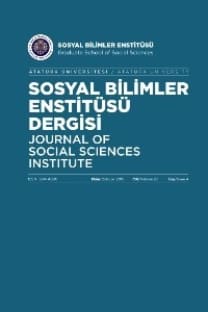Reading Achievement in Foreign Language / Yabanci Dilde Okuma Başarısı
Okuma, Okuma Başarısı, okunabilirlik, Flesch Reading Ease testi
Reading, reading achievement, readability, Flesch Reading Ease test,
___
Brown, J., D. , Janssen, G. Trace, J., & Kozhevnikova, L. (2012). “A Preliminary Study of Cloze Procedure as a Tool for Estimating English Readability for Russian Students”. Second Language Studies, 31(1), pp. 1-22.Carver, R.P. (2000). The Causes of High and Low Reading Achievement. Mahwah, NJ: Lawrence Erlbaum Associates.
Cummins, J. (2008) Reading Instruction and Reading Achievement among EL Students, Pearson Education Retrieved from on December 18, 2013
Dutcher, P. (1990). “Authentic reading assessment”. Practical Assessment, Research & Evaluation, 2(6). Retrieved July 13, 2014 from http://pareonline.net/getvn. asp?v=2&n=6
Rahman, H. (2007). “An Evaluation of the Teaching of Reading Skills of English in Bangladesh. A thesis submitted in partial fulfillment of the requirements for the degree of MA in English”. Retrieved on October 29, 2013 from: http://www.asian-efl-journal.com/Thesis/Thesis-Rahman.pdf
Smith, J., Smith, L., Gilmore, A., & Jameson, M. (2012). Students’ self-perception of reading ability, enjoyment of reading and reading achievement. Learning and Individual Differences, 22() 202-206 Retrieved on December 17, 2013 from http://www.sciencedirect.com/science/article/pii/S1041608011000598#
Taguchi, E., Gorsuch, G., & Sasamoto, E. (2006). “Developing Second and Foreign Language Reading Fluency and Its Effects on Comprehension: A Missing Link”. The Reading Matrix, 6(2)1-18.
ttp://www.buckleycountryday.com/page.cfm?p=1055
http://office.microsoft.com/en-us/word-help/test-yourdocuments-readability- HP010148506.aspx
- ISSN: 1304-4990
- Yayın Aralığı: 4
- Yayıncı: Atatürk Üniversitesi Sosyal Bilimler Enstitüsü Müdürlüğü
Adolf Muschg'un eserlerinde anne-oğul ilişkisi
Reading achievement in foreign language
Down Sendromlu Bireylerin Dil Kullanımının Sesbilimsel İncelemesi: Nörodilbilimsel Değerlendirme
Haluk YERGİN, Mehmet MERCAN, Ömer YILMAZ
Otel Çalışanlarının İşten Ayrılma Eğilimi: Sayfiye ve Şehir Otellerinde Bir Uygulama
Ömer YILMAZ, Haluk YERGİN, Mehmet MERCAN
Balkanlar'dan gelen müslüman göçmenlerin malları sorununa genel bir bakış (1913-1918)
